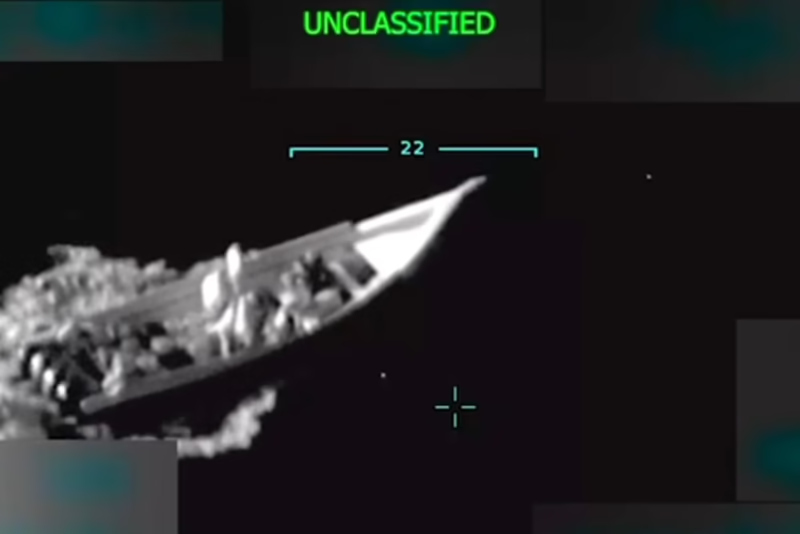On September 2, 2025, U.S. military forces sank a Venezuelan-linked vessel in the southern Caribbean. Intelligence identified the boat as part of the Tren de Aragua gang, a transnational Venezuelan cartel network tied to narcotics, extortion, and human trafficking. Eleven smugglers were killed. Video of the strike spread quickly, showing the precision of the U.S. operation. The Venezuelan government rushed to claim the footage was fake, but U.S. officials stood by the evidence. (RELATED NEWS: U.S. Confronts Venezuela Narco-State)
This was no accident. It was a deliberate blow against a cartel that has pushed poison into American communities for years. For families who have lost loved ones to fentanyl and cocaine, the message was unmistakable: Washington will no longer tolerate business as usual on the high seas.
— Karoline Leavitt (@PressSec) September 2, 2025
Rubio Defends the Operation
The administration defended the strike as both legal and necessary. Secretary of State Marco Rubio said the narco-gangs “pose an immediate threat” to U.S. security. He pointed out that these groups are not ragtag dealers but corporate-style syndicates that traffic in drugs, weapons, and people. Rubio argued that when an imminent danger is identified, the Commander-in-Chief has the right to act.
“The President is going to be on offense against drug cartels.”
Secretary of State Marco Rubio says cartels are in for a rude awakening after the U.S. military destroyed a drug-laden boat from Venezuela. pic.twitter.com/s3kY4RWI8D
— Fox News (@FoxNews) September 2, 2025
“We’re not going to sit back anymore and watch these people sail … like a cruise,” Rubio declared. His blunt words carried the weight of a doctrine shift—no longer waiting until cartels reach America’s shores.
💨= 🔥
— Marco Rubio (@marcorubio) September 2, 2025
More Strikes May Follow
Secretary of Defense Pete Hegseth reinforced that this was just the beginning. He revealed that additional U.S. naval power has already been deployed near Venezuela, including destroyers, an amphibious assault ship, and a submarine. These assets are not symbolic. They are a clear warning to traffickers, Maduro’s regime, and anyone else who profits from America’s pain.
He also said to Fox News:
“I’d say we smoked a drug boat and there’s 11 narco-terrorists at the bottom of the ocean — and when other people try to do that, they’re gonna meet the same fate.”
“I’d say we smoked a drug boat and there’s 11 narco-terrorists at the bottom of the ocean — and when other people try to do that, they’re gonna meet the same fate.”
Pete Hegseth said the U.S. military had the “absolute” authority to strike a Venezuelan boat carrying nearly a… pic.twitter.com/pK4cdv85wu
— Fox News (@FoxNews) September 5, 2025
The administration’s stance is straightforward: more strikes will come if cartels continue their deadly trade. For the first time in decades, the United States is signaling that cartel leaders will face not only prison cells but military firepower.
A Shift From Past Strategies
For years, Washington leaned heavily on Coast Guard interdictions and criminal prosecutions. While important, these efforts left Venezuelan cartels emboldened. Arrest one trafficker, and another steps in. Seize one shipment, and ten more slip through.
This new approach changes the calculus. Instead of chasing smugglers after the fact, the U.S. is eliminating threats before they reach American soil. It is proactive, decisive, and far harder for cartels to counter.
Regional Reactions Are Divided
Not all neighbors welcomed the strike, though some showed strong support. Trinidad and Tobago’s prime minister praised the U.S. for taking bold action, saying the cartels are “evil” and must be stopped with force.
“I, along with most of the country, am happy that the US naval deployment is having success in their mission. The pain and suffering the cartels have inflicted on our nation is immense. I have no sympathy for traffickers; the U.S. military should kill them all violently,” she said in a statement. “Our country has been ravaged by bloody violence and addiction because of the greed of the cartels. The slaughter of our people is fuelled by evil cartel traffickers.”
Colombia’s President Gustave Petro, by contrast, labeled the strike an “extrajudicial killing.”
But while elites argue over definitions, families across the region know who the real villains are. Cartels terrorize communities, enslave women, and funnel drugs northward. For many, America’s action is overdue.
International Law Concerns
Critics questioned whether the strike complied with international law. They claimed the attack occurred in international waters and targeted criminals without trial. Legal scholars debated whether the 2001 Authorization for Use of Military Force applies.
Yet supporters argue that cartels have long crossed the line into terrorism. They kill without hesitation, destabilize governments, and funnel billions into criminal networks. To treat them as ordinary criminals is to ignore the reality on the ground.
The Terrorist Label
Labeling cartels as terrorist organizations has given the U.S. more tools to act. A month ago, the administration increased the bounty on Nicolás Maduro to $50 million and classified the Cartel of the Suns as a terrorist network.
By recognizing cartel violence as a form of warfare, Washington is taking the fight seriously. Supporters point out that these groups flood American cities with fentanyl, fueling record overdoses. Treating them like terrorists reflects the scale of their crimes.
Toward a Military Campaign
This strike is not an isolated event. Rubio made clear it “will happen again.” The administration is preparing a sustained campaign against cartels that threaten U.S. security. Far from a one-off message, it is a standing policy: America will strike first, and strike hard.
— Marco Rubio (@marcorubio) September 4, 2025
Venezuela Prepares for Conflict
Maduro responded with bluster, mobilizing the Bolivarian Militia and declaring “maximum preparedness.” Yet his regime, weakened by sanctions and corruption, cannot match U.S. power. For years, he has sheltered cartels in exchange for profit. Now, that alliance puts him in Washington’s crosshairs.
A New Era of U.S. Anti-Cartel Policy
The obliteration of the Venezuelan drug boat marks more than a single battle. It represents a turning point in U.S. anti-cartel policy. America is tired of watching cartels grow rich while its people suffer. By using military force, the Trump administration is sending an unmistakable message: no safe harbor for traffickers.
The questions raised by critics—about law, sovereignty, and precedent—will linger. But for families grieving loved ones lost to fentanyl, the strike is justice long delayed. The era of passive interdiction is over. The U.S. is on offense. And cartels have every reason to fear what comes next.
Cut through the noise. Drown out the spin. Deliver the truth.
At The Modern Memo, we’re not here to soften the blow — we’re here to land it. The media plays defense for the powerful. We don’t.
If you’re done with censorship, half-truths, and gaslighting headlines, pass this on. Expose the stories they bury.
This isn’t just news — it’s a fight for reality. And it doesn’t work without you.


